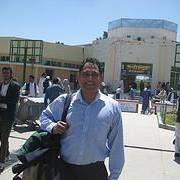The brother of the Afghan president Hamid Karzai, who has been attending talks on his behalf said,
"I have been meeting with Taliban for the last five days and I can tell you Obama's words have created enormous optimism. There is no other way left but talks. All sides know that more fighting is not the way."
The breakthrough comes days after Vice President Joe Biden in Brussels affirmed that ideology and anti-American nationalism were not at the heart of the insurgency, but poverty and the lack of jobs, saying:
"Roughly 70 percent [of Taliban] are involved because of the money, because they are getting paid."
Unemployment in Afghanistan is 40-50 percent, and the Taliban pays a wage to its fighters of $8 a day, which is a king's ransom in this wretched economy.
The Obama administration's position of openness to negotiations comes after a fierce reaction to his announcement of sending 17,000 more troops into harm's way. In a letter signed by key congressmen and spearheaded by the citizen's group PeaceAction, the signers pointed out:
"In a tape released in 2004, Osama bin Laden stated that al Qaedas' goal was to "bleed.. .America to the point of bankruptcy" in Afghanistan. He continued, "All that we have to do is to send two mujahedeen to the furthest point east to raise a piece of cloth on which is written al Qaeda, in order to make generals race there to cause America to suffer human, economic and political losses without their achieving anything of note. . . ." We would do well to pay attention to these threats and to avoid falling into any such trap through escalation of our military presence in Afghanistan."
Among the signers are Republicans Rep. Walter Jones (R-NC), Rep. Ed Whitfield (R-KY), Rep. Roscoe Bartlett (R-MD), and Ron Paul (R-TX). Among Democrats signing are Rep. Dennis Kucinich and Rep. Lynn Woolsey.
The situation is still precarious. Today the Pentagon announced the deaths of 4 U.S soldiers in eastern Afghanistan. AP reported:
The spike in violence along the border is a first indication that roadside bombs and other ambushes are likely to surge as thousands of new U.S. forces arrive in Afghanistan this year.
Despite the new hope, the Obama administration has yet to settle on an alternative strategy to lure poverty-stricken Afghan youths away from the arms of the Taliban. Jobs for Afghans has proposed an immediate "Emergency Works Program for Victory in Afghanistan," which would immediately create employment for up to one million Afghans at little risk to foreign reconstruction personnel. The plan would incorporate the advice of Russian officers with experience in Afghanistan, that the military mission be re-focused on protecting work crews, rather than chasing Taliban across the countryside.
Jobs for Afghans has created a Powerpoint/PDF presentation which it is attempting to put before all Congress members and the Obama foreign policy team. The presentation summarizes in the format of a briefing:
The Question: How do we employ, in a short turnaround time, large numbers of Afghan men who would otherwise join the Taliban for the pay?Problems to Be Solved:
*Major works program is needed to frustrate Taliban recruiting, but construction is difficult in a hostile environment.
*Major changes in USAID reconstruction policy aimed at creating jobs take time. Bidding/contracting process needs to be overhauled ( see Jobs for Afghans Agenda.) But need for jobs is immediate, before Taliban Spring offensive can radicalize population.
Infrastructure Opportunities:
Three-fourths of population has no access to safe drinking water, a major source of high infant mortality and preventable disease. Most of country has no electricity. What do both of these key infrastructures have in common? Both depend on digging thousands of miles of trench to hold water and electrical "pipes." These are the foundations of development which benefits population.
Solution, An Immediate "Pre-Spring Offensive" Phase of Works Program:
*Focus on digging paths for "pipeline" infrastructure with hand-tools, meaning thousands of miles of trench which will carry basic water, electricity, and sewage pipeline, which is the foundation of rural infrastructure.
*Actual pipeline need not be laid immediately, but trenches can be dug using labor-intensive methods.
*Prioritize Kabul's unsanitary open-trench sewage system, potential to hire thousands of workers in easy-to-secure environment.
Project is Technically Feasible:
(Note: You can view every article as one long page if you sign up as an Advocate Member, or higher).





